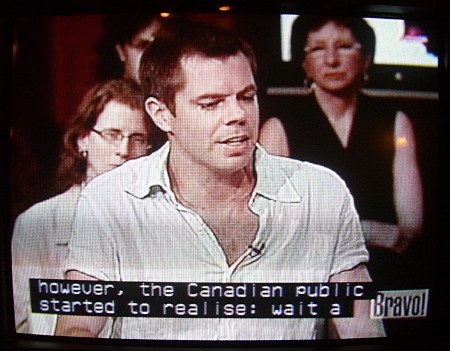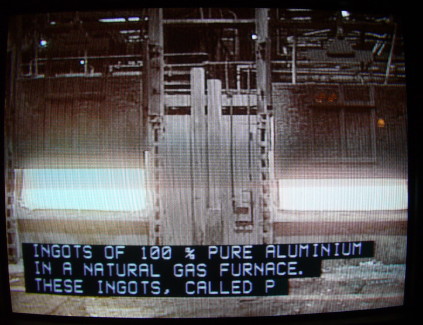![[Joe Clark: Accessibility ¶ Design ¶ Writing] Joe Clark: Accessibility ¶ Design ¶ Writing](http://joeclark.org/joeclark-angie-02IX.jpg)
![[Joe Clark: Accessibility ¶ Design ¶ Writing] Joe Clark: Accessibility ¶ Design ¶ Writing](http://joeclark.org/joeclark-angie-02IX.jpg)
This is a response to Broadcasting Notice of Consultation CRTC 2009-77. The entire issue of time credits for dubbed programming needs to be reexamined; the actual problem is captioning in Canadian English.
This intervention is permanently located at the address:
I have a degree in linguistics and a longstanding interest in minority languages. I wrote the book Organizing Our Marvellous Neighbours: How to Feel Good About Canadian English.
National French (fr-FR) means French spoken in France. Canadian French (fr-CA) is the French spoken everywhere in Canada, including Quebec, which, I remind readers, is actually part of Canada. Canadian English (en-CA) is the English spoken everywhere in Canada, including in Quebec. There are regional subvariants of all those variants, notably Quebec French (fr-CA-QC), Acadian French (fr-CA-NB-acadien), and Montreal English (en-CA-QC-YUL).
The call for comments asks questions about time credits for Canadian-dubbed (really Quebec-dubbed) Canadian programs. That is its ostensible reason for being. But nobody is fooled. This entire discussion is not actually about “the French-language audience in Canada.” It’s about crypto-nationalist viewers in Quebec and a commercially inconsequential Quebec-based dubbing industry.
The call for comments talks about Canadian English shows dubbed into national French, a seemingly hypothetical problem that causes “the French-language audience in Canada [to] have trouble identifying with the program.” In other words, such viewers find themselves humiliated or humbled by the program. The fact that this call for comments even came into existence seems like a kind of comeuppance on the part of Francophone CRTC employees, who, the CRTC’s own survey showed, also tend to feel humiliated or humbled.
It is not clear how the Broadcasting Act protects the right of, say, pure-laine Quebeckers to “identify” with programs produced in a country some would insist they’ve never visited. Grey’s Anatomy probably seems a lot more familiar to these viewers than Da Vinci’s City Hall would be. An American program represents no threat to the Quebec nation, while a program from Vancouver tends to upset the apple cart through its insistence that a Canadian city where 98.7% of the population fails to speak French could make for good TV.
The call for comments operates under the misconception that en-CA programs dubbed into fr-CA must be dubbed in Quebec. In fact, foreign nations could easily dub those productions into fr-CA by hiring native speakers of fr-CA as voice actors. Every single en-CA show could be dubbed into fr-CA in Paris. Offering any kind of regulatory boost to fr-CA will not guarantee extra jobs in Quebec, the implied goal.
Anglophone viewers are quite aware of the fact that dialect and location of recording studio are separate and uncoupled issues. The announcers on BBC Canada (really just one: Steve Watts) all work out of Toronto despite being native en-UK speakers.
If this is really about “Canadian” French, what if we struck a deal that broadcasters could get 150% credit for fr-CA programs dubbed into en-CA as long as the dubbing took place in any province or territory other than Quebec? How about a 150% time credit for French dubbing carried out in New Brunswick, or, say, Alberta? Wouldn’t that handily solve the problem? Or is that really not actually the problem?
Isn’t this entire process about rewarding a commercially inconsequential Quebec dubbing industry for doing business in Quebec?
Neither the Broadcasting Act nor other federal laws requires private broadcasters to air French-language programming. Every private French-language station could close tomorrow and no law would be broken. That might not apply to the CBC and two provincial public broadcasters, but it is a truism of the regulated-free-market system of private broadcasting we “enjoy” in Canada. It follows, then, that there is no legal requirement to dub programming, of any national origin, into French.
Meanwhile, there are strict legal requirements to provide captioning – in both official languages and on all manner of broadcast stations, private and public. The Broadcasting Act states the need for accessible programming; CRTC regulations and the Canadian Human Rights Act give legal effect to this need. The Canadian Human Rights Tribunal has ruled that a denial of captioning amounts to infringement of the right to receive services without discrimination due to disability.
French-dubbed programming is not legally necessary. Captioning, including English-language captioning, is.
On any scale the actual crisis in linguistic representation is captioning, not dubbing.
The CRTC’s own figures show that private broadcasters spend three times as much on captioning as they do on dubbing.
Captioned hours telecast are orders of magnitude higher than dubbed hours telecast even on French-language stations.
English-language captioning in Canada displays an orthographic mishmash. Captioners are either completely ignorant of the fact that Canadian spelling exists (perhaps wilfully so), or reject the concept entirely, or are too French to tell the difference.
I expect that no readers of this intervention who work at the Commission, broadcasters, or captioning houses could explain Canadian spelling even if I gave you a week and full access to any reference material you wanted. They couldn’t explain it even if they asked me to explain it to them so they could rewrite what I said in their own words. So as a bit of a skill-testing question, I will ask readers in those categories: Does Canadian spelling exist, and if so, what makes it different?
In-house captioning departments (like the one at the former CHUM) implicitly maintain that Canadian spelling does not exist. Despite the fact that spoken Canadian English is American English, these departments enact a subconscious anti-Americanism and pretend Canada is fundamentally a British country. (Except for the French part, of course.) These captioners carry out a form of orthographic colonialism in which Canadian-born and -raised speakers are captioned as though they were speaking the Queen’s English:

These captioners manifest a common Canadian psychology. They don’t know Canadian spelling exists (or they just pretend it doesn’t); it only stands to reason that they have to pick some kind of spelling to use, and by God it’s not going to be the American kind. The Canadian broadcasting system is predicated on retransmission of American programming, but perhaps to atone for the filthiness of the lucre such programming brings in, captioners reject American spellings in favour of what they think differentiates us from Americans – our British heritage. To say this one more time, if these people have to choose between British and American, you bet your life they’re never gonna go American.
Half-assed third-party captioners, like BCCS, also don’t know the difference and pretend they’re working somewhere in the British Isles. The same goes for the putative bilingual house run by Francophones (Mijo), which never found a period or comma it couldn’t place outside of quotation marks or a program to which it couldn’t add an m and an e.
The problem for all these outfits is that Canadian English uses neither American nor British spelling. They are ignorant of or they ignore this fact.
French-language captioning houses (la Sette, CNST, Global Vision, the old Technicolor) allow non-native speakers to caption English-language programs. As ever in Canada, a Francophone with any ability to speak English gets a pass (in this case, is allowed to caption English programming), though the converse is never true. These people cannot even hear English affixes and, in a perverse mishmash of Quebec nationalism and allegiance to the Crown, sprinkle their own phonological deficiencies among British spelling traditions.


The entire issue of time credits for dubbed programming needs to be reconsidered from scratch. I see no reason for their existence. The stated reason for the current discussion is at disingenuous odds with the real reason, which is a kind of backdoor promotion of Quebec culture under the guise of “Canadian French.”
By any standard – legal, financial, numerical – the real issue is captioning, not dubbing. Nobody has advanced any kind of evidence that legitimate fr-CA dubbing is in peril in Canada, whereas legitimate en-CA captioning barely exists.
The Commission should publish no decision on the current case and should start a new proceeding to reconsider the entire issue of time credits for dubbed programming, with the stated default position that such credits should be eliminated.
Posted: 2010.03.30